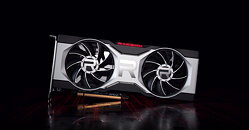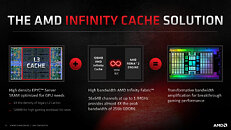Raevenlord
News Editor
- Joined
- Aug 12, 2016
- Messages
- 3,755 (1.22/day)
- Location
- Portugal
| System Name | The Ryzening |
|---|---|
| Processor | AMD Ryzen 9 5900X |
| Motherboard | MSI X570 MAG TOMAHAWK |
| Cooling | Lian Li Galahad 360mm AIO |
| Memory | 32 GB G.Skill Trident Z F4-3733 (4x 8 GB) |
| Video Card(s) | Gigabyte RTX 3070 Ti |
| Storage | Boot: Transcend MTE220S 2TB, Kintson A2000 1TB, Seagate Firewolf Pro 14 TB |
| Display(s) | Acer Nitro VG270UP (1440p 144 Hz IPS) |
| Case | Lian Li O11DX Dynamic White |
| Audio Device(s) | iFi Audio Zen DAC |
| Power Supply | Seasonic Focus+ 750 W |
| Mouse | Cooler Master Masterkeys Lite L |
| Keyboard | Cooler Master Masterkeys Lite L |
| Software | Windows 10 x64 |
Hot on the heels of NVIDIA's recent Cryptocurrency Mining Processors (CMP) launch and slightly debacled driver-level neutering of popular mining algorithms with their latest GeForce RTX 3060, AMD product manager Nish Neelalojanan confirmed to PC Gamer that AMD's stance is a fundamentally different one: that they won't be the ones to decide what their customers can or can't do with their hardware. His words, precisely, were this: "We will not be blocking any workload, not just mining for that matter."
Nish then went on to speak on how AMD - and its current RDNA2 product stack - have been specifically geared and optimized for gaming workloads. There are some architectural choices present in RDNA2 that automatically reduce its utility and performance when it comes to mining, such as its infinity Cache - an architectural choice that aims to increase gaming performance by improving cache hits, at the expense of overall memory bandwidth (the most important metric for actual mining operations).


This is why AMD's latest gaming behemoth RX 6900 XT, for example, offers about the same ~54 MH/s Ethereum mining performance as its older (and much smaller) RDNA-based RX 5700 XT. This is an interesting way to frame the problem, and it does naturally lead to lesser demand for AMD's graphics cards compared to NVIDIA's (the RTX 3090, for example, offers a gargantuan up to 120 MH/s in mining algorithms). This doesn't however mean that AMD isn't working on a CMP-like product line based on older technologies that can sate demand for cryptocurrency mining.
Nish then doubled-down on AMD's commitment to gaming:
"All our optimization, as always, is going to be gaming first, and we've optimized everything for gaming. Clearly, gamers are going to reap a ton of benefit from this, and it's not going to be ideal for mining workload. That all said, in this market, it's always a fun thing to watch." I beg to differ on that last part, though. It's definitely not fun to watch the state of the market for gaming-related hardware.
View at TechPowerUp Main Site
Nish then went on to speak on how AMD - and its current RDNA2 product stack - have been specifically geared and optimized for gaming workloads. There are some architectural choices present in RDNA2 that automatically reduce its utility and performance when it comes to mining, such as its infinity Cache - an architectural choice that aims to increase gaming performance by improving cache hits, at the expense of overall memory bandwidth (the most important metric for actual mining operations).


This is why AMD's latest gaming behemoth RX 6900 XT, for example, offers about the same ~54 MH/s Ethereum mining performance as its older (and much smaller) RDNA-based RX 5700 XT. This is an interesting way to frame the problem, and it does naturally lead to lesser demand for AMD's graphics cards compared to NVIDIA's (the RTX 3090, for example, offers a gargantuan up to 120 MH/s in mining algorithms). This doesn't however mean that AMD isn't working on a CMP-like product line based on older technologies that can sate demand for cryptocurrency mining.
Nish then doubled-down on AMD's commitment to gaming:
"All our optimization, as always, is going to be gaming first, and we've optimized everything for gaming. Clearly, gamers are going to reap a ton of benefit from this, and it's not going to be ideal for mining workload. That all said, in this market, it's always a fun thing to watch." I beg to differ on that last part, though. It's definitely not fun to watch the state of the market for gaming-related hardware.
View at TechPowerUp Main Site





